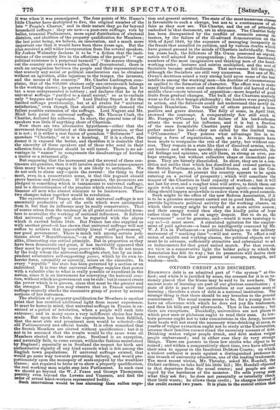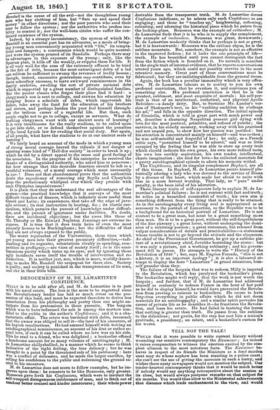OXFORD CREDIT AND DISCREDIT.
Exonsions debt is an admitted part of "the system" at Ox- ford ; and while it is justified by some, the censure for it is so va- riously placed that the blame may be said to lie nowhere. The ancient seats of learning are part of our glorious constitution ; a state of debt is part of the curriculum at our ancient seats of learning ; therefore a state of debt is a national institution. The strange thing is that there should be any breaches to the general contentment. The usual course seems to be, for a young man to have an allowance with which he does not pay his tradesmen, and then his bills are paid afterwards. That is the routine ; but there are exceptions. Decidedly, universities are not places to which poor men or plebeians ought to send their sons. As low- born persons ought not to take commissions in the Army, because their heads will not stand the necessary wine-drinking at mess, so youths of vulgar extraction ought not to study at the Universities, because their families cannot stand the necessary amount of debt. Drinking makes vulgar people drunk, and debt makes vulgar people embarrassed ; and in either case they do very strange things. There are parents in these low circles who object to be ruined ; and within a comparatively short time, two have allowed their sons to appear in the Insolvent Debtors Courts; on which a violent outburst is made against a distinguished professor in this branch of university education, one of the leading tradesmen. The most recent victim, Mr. Throsby, asked Mr. Randall, the Oxford outfitter, to take half his little bill ; Mr. Randall objected to that departure from the usual course; and people are out- raged by the harshness of the monster. He sells young men what they ask for; he does not parentally
or tutorially ch4
their little wants; he allows them credit ; he charges interest if the credit exceed two years. It is plain to the stoical critics that Benda- /1 is the cause of all the evil—not the thoughtless young men who buy clothing of him, but "flare up and spend their money" in other directions ; nor the poor parents who send their sons to follow the system ; nor the authorities who profess ina- bility to control it; nor the well-born circles who suffer the con- tinued existence of the system. Indeed, by a strange inconsistency, the system of which Mr. Randall is an essential part has its advocates, as a mode of bring- ing young men conveniently acquainted with "life," its tempta- tions and dangers ; a convenience which would be quite neutral- ized were the system pruned of its Randalls. Perhaps there may be advantages in this exposure of the young ; only, like the Spartan plan, it kills off the weakly, or cripples them for life. It is all very well for the sons of the extremely affluent to be tried in the fire of debt, because the most extravagant debts of a lad can seldom be sufficient to swamp the revenues of lordly houses ; though, indeed, successive generations may contribute, even by these schoolboy excesses, to leave awkward reminiscences in the familyarchives, swelling the sort of private national debt
i
which s supported by a great number of distinguished families. But the poorer classes who forget their place find it hard : a clergyman son is sent to college, and crowns his education by bringing home a schedule of debts, which impoverish his father, take away the fund for the education of his brothers and sisters, and perhaps burden the poor fool himself through- out the tedious career of a regretful life. But then, such people ought not to go to college, except as servants. What do working clergymen want with our ancient seats of learning ? It is very troublesome for the really studious, to be called upon to get into debt, or to defend themselves against the penalties of the local Lynch law for evading that social duty. But again, of all people, what have the studious to do at our ancient seats of learning ? We lately heard an account of the mode in which a young man of strong moral courage braved the ridicule if not danger of entering some kind of" Hell-fire society" in order to break it up ; which he did by a direct appeal to the sense and good feeling of the associates. In the progress of his enterprise he received the thanks of a distinguished authority, who asked him to persevere : but how strange that this desirable function should be left to a youthful volunteer, of a moral courage which must necessarily be rare ! Does not that abandonment prove that the authorities doubt the expediency of removing any Scylla and Charybdis from the probationary whirlpool over which they preside with such Olympian impassiveness ?
It is plain that they di understand the real advantages of the system—the practical knowledge that it conveys of the most difficult branches of finance, which is infinitely more useful than Greek and Latin ; its experiences, that take off the edge of juve- nile ardour ; its real instruction in boating, &c. ; its elastic cur- riculum, which permits the pursuit of knowledge under difficul- ties, and the pursuit of ignorance under facilities. No doubt, there are incidental objections ; but the cases like those of Mr. Throsby or Mr. Edward Mapleton Jennings are extreme in- stances. It is true that it does train heirs of even the most princely houses to be Buckinghams ; but the difficulties of that kind are not always exposed to the public.
The worst reproaches of the Universities, those vices which get young men into their greatest pecuniary difficulties,—tuft- hunting and its cognates, ostentatious rivalry in spending, com- petition in profligacy,—are vices of society itself; so is the sanc- timonious purity which turns up its eyes, and by ignoring these ugly incidents saves itself the trouble of intervention and re- formation. It is neither just, nor, which is more, worldly-know- ing, to make Mr. Randall the scapegoat for these sins. Society is guilty, and society is punished in the transgressions of its sons, and eke in their little bills.



























 Previous page
Previous page